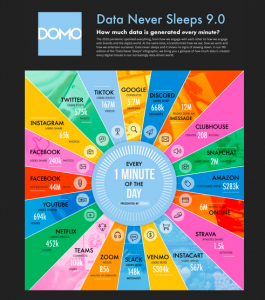 Confess – you’re spending more time than ever online. There are work events on Zoom and Teams. There are photos and messages from family and friends on Facebook and Instagram. There’s YouTube and Twitter and TikTok. And then there’s Wordle and all its many variations. Oh, and Words With Friends. (Guilty pleasure!)
Confess – you’re spending more time than ever online. There are work events on Zoom and Teams. There are photos and messages from family and friends on Facebook and Instagram. There’s YouTube and Twitter and TikTok. And then there’s Wordle and all its many variations. Oh, and Words With Friends. (Guilty pleasure!)
What are the chances you’ll be on the specific channel at the specific time someone shares an interesting post? Pretty slim, when you consider there are some 575,000 messages flashing by every minute on Twitter alone, according to Domo.com. Whooosh!
That fleeting nature is one reason I like to reshare some of the interesting, helpful and sometimes funny articles I’ve run across. Here are some recent ones:
Word choice
- “Intelligent readers outside the classroom don’t want big words. They want complex ideas made simple” and (I love this) “Complicated language can send a signal that a writer is dense or overcompensating.” By Derek Thompson for The Atlantic.
- For Ukraine — and all news coverage — journalists need to pay attention to word choices. “The way we report can engender compassion or it can lead to othering by reinforcing unconscious bias,” says Doris Truong via Poynter.
- Wend, eke, lurch and other “old” words preserved in common expressions, from Mental Floss.
- A guide to redundant acronyms (RAT test instead of RAT, PIN number instead of PIN) by David Astle in The Sydney Morning Herald.
Writing tips
- Five ways to create “fizz” when crafting your email subject lines, by Tiffany Markman for IABC’s Catalyst.
- Some eccentric tips, like “stop writing,” that help self-described bigshot writing coach Roy Peter Clark beat writer’s block.
- Write about benefits (verbs), not features (nouns) in headlines, says Ann Wylie. For a striking example, check out the alternative to “Women’s Health Conference.”
- Do you have to write a vision statement? Beware of the “visionless vision statement” – one that’s abstract, over-detailed yet under-precise, has Legal’s hands all over it and more. Dr. Clare Lynch explains how to avoid it in this classic post.
Personal
- Four tips for overcoming imposter syndrome, including connect with a mentor and let go of perfection (ha!), via Ragan Communications.
- Introverted? You can still succeed in PR, says Mike Bradley in PR Daily. His five tips include the all-important “set aside recovery time.”
Related reading:
Links from March, including readability, diversity and a big proofreading fail
Links from February, including how to help Ukraine, plain language and a bit of silliness
Links from January, including jargon to avoid and some powerful stories
ICYMI is In Case You Missed It. Image from Domo.com’s Data Never Sleeps, or what happens on the internet every minute.
